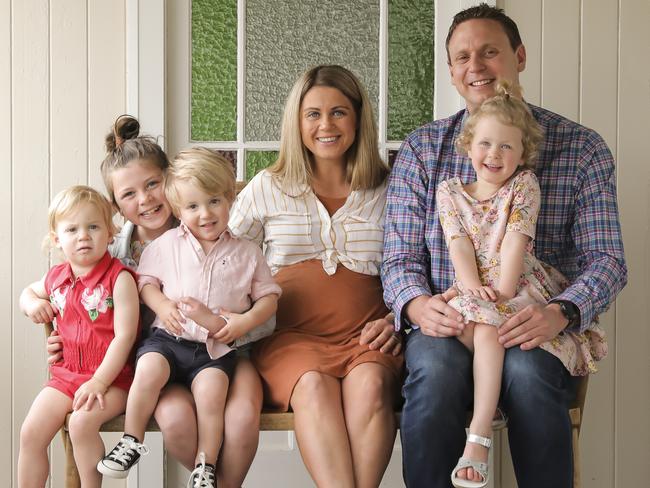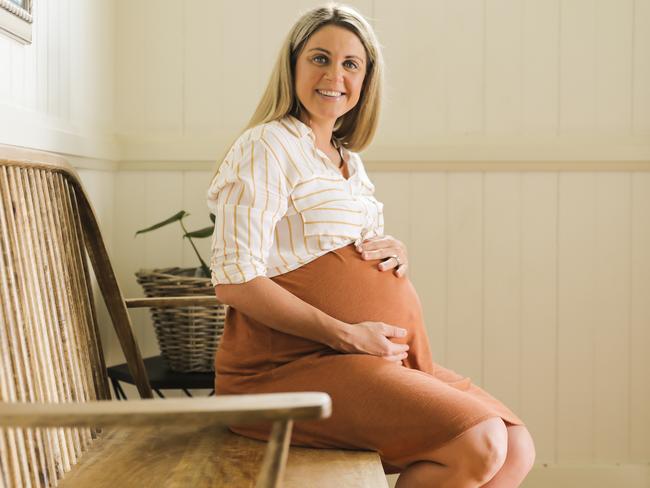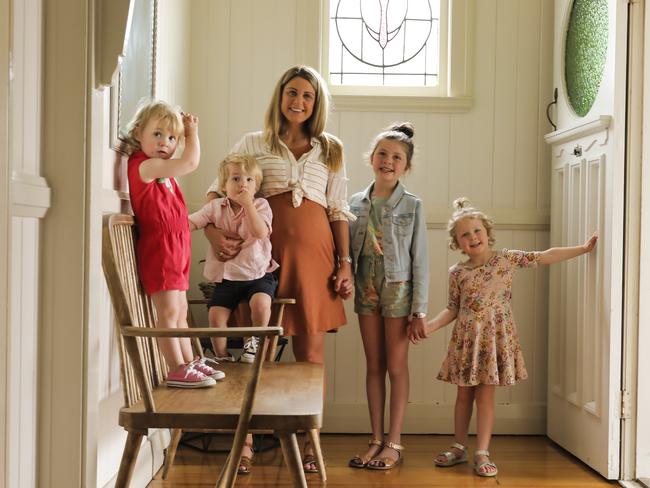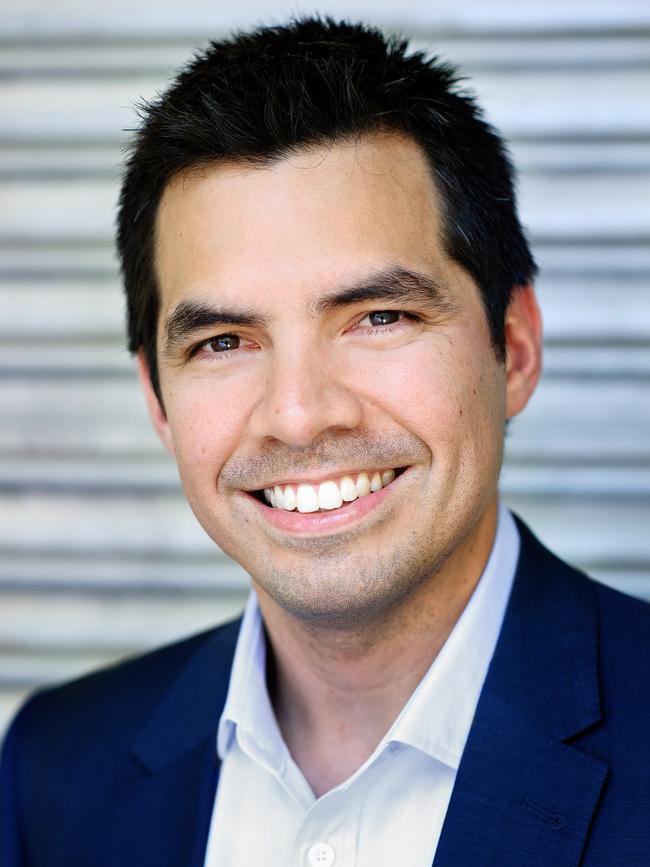Why I’m having my 5th baby for a stranger
Brisbane mother-of-four Jess Newman is about to give birth to a baby boy for a couple unable to have children. As an altruistic surrogate she doesn’t get paid and met the intended parents for the first time last year.
QLD News
Don't miss out on the headlines from QLD News. Followed categories will be added to My News.
So this is it, Jess Newman thinks.
After “all the everything” – the tiny kernel of an idea that would not go away, all the talking, the boxes ticked, the hoops jumped through, and the wishes whispered deep in the night, this Tuesday at 11am, Jess will take a deep breath in an operating theatre at the Brisbane Private Hospital, Spring Hill, and deliver a baby.
Then, without touching the newborn at all; without putting his head to her chest, or closing her eyes to breathe in his scent, she will look on as her obstetrician hands the baby boy not to her, but to his mother.
The question of how Jess, 33, married to Chris Newman, 36, has been able to carry another woman’s child, feeling his tumble turns against her skin, all the while looking after her own brood of four children; Scarlett, 9 (Jess’s daughter from a previous relationship), Georgie, 4, and fraternal twins Angus and Frankie, both 2, has a very simple answer, she says.
It’s love – with big dollops of luck thrown in.

In the kitchen of their inner-city Queenslander where photos of their four children line the wall, Jess and Chris Newman, with some first-class banter between them (Chris: “When I met Jess I was 29 and getting worried I wouldn’t meet anyone.” Jess: “But you didn’t settle, let’s make that clear.”) and frequent, joyous eruptions of laughter, tell that story of love, luck, and, it must be said, science.
“Chris and I never had any problems getting pregnant, none at all,” Jess, a human resources adviser for a mining company, says.
“My pregnancies are problem-free, I carry to full term, my deliveries – I have caesareans by choice – are easy, my recovery is quick, and I know, I really do know, how lucky that is.
“When Chris and I got married, and started having our babies, there was just this increasing awareness that for others, including friends of ours, it wasn’t easy at all. And I just had this niggling thought that maybe I could do this for someone else, that maybe I should do this for someone else.
“The thought that kept coming back was that maybe because I was so lucky, I could help someone else be lucky too.”
That “someone else” turned out to be two complete strangers to the Newmans; a couple we’ll call (they wish to remain anonymous) Emily and Hamish, and a couple who on Tuesday will hold their son in their arms – a little boy made from Emily’s egg, Hamish’s sperm, and Jess laughs, “my oven”.
“That’s the moment I cannot wait for”, Jess smiles,

“the one I think about every single day, is the moment when Emily meets her baby”.
Hamish and Emily, also in their 30s, have long wanted children. It is medically impossible for Emily to carry a child, but she can and does ovulate regularly.
She is also, Jess says, “kind, loving, funny and strong”, the perfect recipient, in many ways, to be touched by some of that Newman “luck”.
“Once I decided that I really did want to help someone else have a baby, and once I spoke to Chris about it (more on Chris Newman, surely Queensland’s poster boy for feminism, later),
we went to see our obstetrician, David Moore, who had delivered all our children.
“I wanted to know what becoming a surrogate would entail, all the legalities of it and whether or not after four children I was still a candidate, whether I could have another caesarean.
“He talked us through the whole process, and told us, yes, I could do it, and if I did, it would be just another pregnancy, with no more risk or less risk than others.”
“So I just started putting the word out among friends that I wanted to be a surrogate, and quite quickly someone told me about Emily.
“My friend asked her if it was all right, I got her details, she said yes, and so I sent her an email.”
Hands clasped across her very ripe tummy (at the time of the U on Sunday meeting, Jess was 37 weeks pregnant), she laughs.
“It was a hard one to write: How do you say to someone, ‘Hi. You don’t know me, but my name is Jess and I’d like to have your baby’.”
Instead she settled for a slightly less confronting greeting, explaining that she knew of Emily’s desire to have a child, gently suggesting that she (Jess) might be able to help, and perhaps they could meet.
That was in January, 2017; in February 2017,
the two couples met at the Newman home. Over coffee, some Anzac biscuits, some laughs, a few tears, they formed a friendship that Jess says felt comfortable instantly. And for Chris Newman that was the key.

“I’ll be honest, when Jess first told me she wanted to be a surrogate, my initial reaction was negative,” he says.
“Not because I was against it, but because I was worried how she would cope with four children and me working fulltime (Chris is an employment lawyer). I was worried about the impact it would have on her, and I suppose on our own family.
“But after Jess explained why she wanted to do this, and I could see how very committed she was, I was 100 per cent behind her.
“A big part of that is because I know that if there was something I really wanted tot do, Jess would do the same for me. Then of course, it’s Jess’s body, not mine, so she gets to decide what she wants to do with it (see earlier note on poster-boy for feminism).
“The other thing is that I came from a close family, Jess comes from a close family, and
I wanted a close family of my own.
“So I guess we were both coming from a position of understanding that yearning for family, and how it must be to want that and not be able to have it. So, yes, by the time Emily and Hamish came over, it really wasn’t a question of whether or not Jess was going to be a surrogate but who she was going to be a surrogate for.
“I saw those two girls talking and laughing together that day, I knew, I thought, ‘This is it, this is happening, Jess has just met the woman whose baby she is going to have’.”
Jess smiles.
“I knew it too – about a week later we met up with Emily and Hamish again, and said,
‘We would like to help you have your baby’.”
Emily, Jess says, cried.
First, however the hoops – the legal, medical, psychological and financial hoops would-be surrogates, and would-be “intended parents” have to jump through in Australia.
Jess is what’s known as a “gestational” surrogate, meaning she is carrying her intended parents’ own embryo, created from their eggs and sperm, while “traditional” surrogates use their own eggs, which are retrieved, then fertilised with the male’s sperm to create the embryo.
In both cases, the embryo is then transferred via a catheter into the surrogate’s womb.
In both cases, there is also a six-month waiting period before this implantation can be done, during which time certain requirements must be met.
Enter Dr David Moore, Jess’s obstetrician, gynaecologist and fertility specialist from Eve Health at Spring Hill, who steered the couples through those six months.
Moore says he “never had any doubt” the result would be a successful surrogacy story.
“It’s a pretty remarkable thing that Jess has done, to help this other couple have their own, genetic child, for no other reason than genuinely wanting to help someone.
“But if you know Jess (and Moore does, having delivered her four children), she’s a pretty remarkable human being.”

Moore says that there has to be a medical evaluation for the surrogate and the intended mother, ensuring the procedure is both safe and necessary.
“Once that is done you have to submit an application to the appropriate organisation (in this case the Queensland Fertility Group), who will put the parties in touch with a counsellor, and also advise each couple to arrange legal representation.”
In Queensland, surrogacy is altruistic; no money must change hands, although the intended parents do pay the surrogate’s medical expenses.
A surrogacy agreement or contract has to be formulated, and while each case is different, it hammers out questions such as what happens if the intended parents die before the baby is born, or divorce, as well as formulating binding agreements surrounding visitation, and any possible change-of-heart from either party.
Once all of these details are agreed to, the application is re-submitted for approval by an ethics committee.
But once approved, it’s all systems go.
On Saturday, February 3 this year, Jess and Emily entered the Brisbane Private Hospital’s gynaecology ward together.
A photo from that day shows the two women wearing identical, fetching hospital gowns and hair nets, their arms flung around each other, their smiles leaping out at the camera.
“That was such a great day”, Jess remembers, “it was really, really exciting.
“Emily held my hand in the operating theatre, she was holding it so tightly and I could hear her heart pounding, it was just boom, boom, and boom against me.
“I’m lying down, my legs are in stirrups, the scientist comes in, he said, ‘Your embryo has defrosted overnight, and it’s perfect’, and then you are injected with it through a catheter, and you can sort of see it attach itself to your uterus on the screen.
“It’s so quick, it goes in like, two seconds, and then it’s like this blip on the screen, and bang! You’re pregnant.”
Sort of. Once the embryo has been implanted (it is usually about three weeks old at the time), the recipient must wait another four weeks to do a blood test to have the pregnancy confirmed.
In early March this year, Jess received a call from Moore.
“He said ‘Congratulations, you’re pregnant – now go ring Emily!’”
For the past eight months, Jess and Emily have been pregnant together – Jess making sure that every step of the way, Emily has felt like who she is, the baby’s mother.
“We go to all the appointments together,
all the tests, I send her emails and texts and updates. I might say, ‘Your baby made me vomit at two o’clock this morning!’, or I’ll send photo of us on holiday and I’ll caption it, ‘Hey Mum, I’m at
the beach!’. I am very, very clear on whose baby this is.”
For his part, Chris says he is 100 per cent certain that Jess is not going to say, ‘Jeez, I want that baby’ at any stage prior to, or after the birth.
“No chance, not the slightest.” he says, shaking his head. “All Jess wants to do is to give Emily and Hamish their child.
“That’s all it’s ever been about, and she has not wavered from that for a second.
“For neither of us has this felt like ‘our’ pregnancy.”
This Tuesday, Jess and Emily will once more walk into the Brisbane Private Hospital together, but this time they will go to the delivery suites.
With Hamish there, as well as medical staff, but not Chris who says he will be waiting outside, as he is not the expectant father, the two women will once again hold hands, as Jess delivers a baby boy.
She will not touch him, explaining, “No, this is their baby, not mine. They are the first, their baby goes to them.
“I have been waiting nine months to see this baby in their arms.”
And when he is, when Jess looks at Emily with her baby boy’s tiny head nestled against Emily’s chest, or when Emily leans down to breathe in the scent of her newborn’s hair, what does Jess think she might say to her?
“I don’t know, I don’t know for sure.
“I think it’s going to be a pretty wonderful moment to be a part of.
“I think what I might say is something she’s been waiting for so long to hear.”
Jess Newman smiles her lovely, generous smile.
“I think I’ll just say, ‘Hi, Mum’.”
QUEENSLAND SURROGACY LAWS
The Queensland Surrogacy Act 2010, allows for altruistic surrogacy. Commercial surrogacy (paying for someone to carry your baby) is illegal.
Birth parents and intended parents must: obtain independent legal advice, have counselling from an appropriately qualified counsellor, and after this agree on a formal written surrogacy agreement.
The birth mother must register the baby’s birth and at this stage, the birth mother is still the legal parent.
After the birth the intended parents apply for a parentage order but can only do so after they live with their baby for 28 days. When a court grants the parentage order, this will mean the birth mother/parents no longer have a legal parental relationship with the baby.
Surrogacy arrangements are not enforceable.
This means the birth mother may change her mind at any time before the court makes a parentage order.
For more information: www.qld.gov.au/law/births-deaths-marriages-and-divorces/surrogacy


